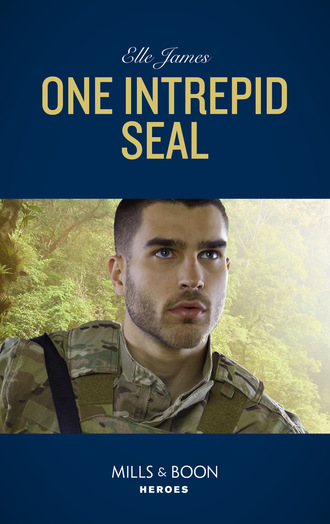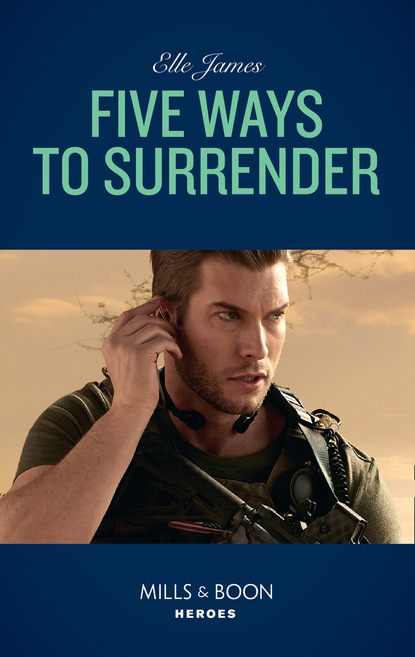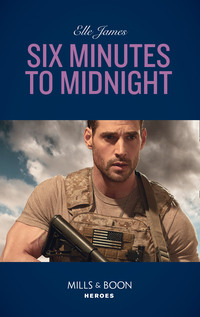
Полная версия
One Intrepid Seal

This SEAL found his target...
then lost his heart
Navy SEAL “Diesel” Dalton Samuel Landon can see that Reese Brantley is no damsel in distress. But his mission is clear—infiltrate the hostile rebels’ jungle hideout in Africa and rescue Reese and her boss. Separated from his team—and her boss—Diesel and Reese are on the run. Bullets fly, but risking his life is part of the job. Struggling with their hotter-than-the-jungle attraction, though, proves the real danger is losing his heart.
ELLE JAMES, a New York Times bestselling author, started writing when her sister challenged her to write a romance novel. She has managed a full-time job and raised three wonderful children, and she and her husband even tried ranching exotic birds (ostriches, emus and rheas). Ask her, and she’ll tell you what it’s like to go toe-to-toe with an angry three-hundred-and-fifty-pound bird! Elle loves to hear from fans at ellejames@earthlink.net or www.ellejames.com.
Also by Elle James
One Intrepid SEALHot CombatHot TargetHot ZoneHot VelocityNavy SEAL SurvivalNavy SEAL CaptiveNavy SEAL to Die ForNavy SEAL Six Pack
Discover more at millsandboon.co.uk
One Intrepid SEAL
Elle James

www.millsandboon.co.uk
ISBN: 978-1-474-07889-4
ONE INTREPID SEAL
© 2018 Mary Jernigan
Published in Great Britain 2018
by Mills & Boon, an imprint of HarperCollins Publishers 1 London Bridge Street, London, SE1 9GF
All rights reserved including the right of reproduction in whole or in part in any form. This edition is published by arrangement with Harlequin Books S.A.
This is a work of fiction. Names, characters, places, locations and incidents are purely fictional and bear no relationship to any real life individuals, living or dead, or to any actual places, business establishments, locations, events or incidents. Any resemblance is entirely coincidental.
By payment of the required fees, you are granted the non-exclusive, non-transferable right and licence to download and install this e-book on your personal computer, tablet computer, smart phone or other electronic reading device only (each a “Licensed Device”) and to access, display and read the text of this e-book on-screen on your Licensed Device. Except to the extent any of these acts shall be permitted pursuant to any mandatory provision of applicable law but no further, no part of this e-book or its text or images may be reproduced, transmitted, distributed, translated, converted or adapted for use on another file format, communicated to the public, downloaded, decompiled, reverse engineered, or stored in or introduced into any information storage and retrieval system, in any form or by any means, whether electronic or mechanical, now known or hereinafter invented, without the express written permission of publisher.
® and ™ are trademarks owned and used by the trademark owner and/or its licensee. Trademarks marked with ® are registered with the United Kingdom Patent Office and/or the Office for Harmonisation in the Internal Market and in other countries.
www.millsandboon.co.uk
Version: 2020-03-02
MILLS & BOON
Before you start reading, why not sign up?
Thank you for downloading this Mills & Boon book. If you want to hear about exclusive discounts, special offers and competitions, sign up to our email newsletter today!
SIGN ME UP!
Or simply visit
signup.millsandboon.co.uk
Mills & Boon emails are completely free to receive and you can unsubscribe at any time via the link in any email we send you.
This book is dedicated to my travel buddies who make every trip fun and exciting. Africa is on our bucket list. We hope to make it there soon. We decided a long time ago not to wait until we retired to travel. I’m glad we made that decision. We’ve been to a lot of fun and interesting places and have so many more to visit! If I can’t get to some places, I read about them and learn. That’s the joy of books. Happy reading!
Contents
Cover
Back Cover Text
About the Author
Booklist
Title Page
Copyright
Dedication
Chapter One
Chapter Two
Chapter Three
Chapter Four
Chapter Five
Chapter Six
Chapter Seven
Chapter Eight
Chapter Nine
Chapter Ten
Chapter Eleven
Chapter Twelve
Chapter Thirteen
Chapter Fourteen
Extract
About the Publisher
Chapter One
Reese Brantley held on to the frame of the window as the Land Rover bounced wildly over the rugged terrain. “Slow down!” she shouted to the driver.
Mubanga, the Zambian guide, seemed not to hear her. More likely, he completely ignored her as he leaned to the left to look beyond the obstruction of a pair of legs dangling over the windshield from a perch on the roof of the cab. He followed the racing leopard across the ground, heading north into the rocky hills, determinedly keeping up with the beautiful creature.
Ferrence Klein, Reese’s client, who’d paid over one hundred thousand dollars for this hunting expedition, clung to his rifle from his position strapped to the top of the vehicle.
“He’s not even supposed to be shooting leopards, is he? I thought there was a ban on shooting big cats? What the hell are you thinking?” Had Reese known Klein was coming to Africa to bag a leopard, she’d have told him no way. Her understanding was that he was there on a diplomatic mission for his father, the Secretary of Defense.
She wasn’t playing bodyguard to an endangered-animal killer. If they weren’t traveling so fast and furious, she’d have gotten out of the vehicle and taken her chances with the wildlife, rather than witness the murder of a magnificent creature.
The leopard jagged to the right and shot east into the rocky hills.
Rather than turn and follow, Mubanga kept driving north.
“Hey!” Klein yelled from the front of the vehicle. “The cat turned right!”
Mubanga completely ignored Klein and increased his speed.
The vehicle jolted so badly, Reese fought to keep from being thrown from her seat. The seat belt had long since frayed and broken. If she wanted to keep her teeth in her head, she had to brace herself on anything and everything to keep from launching through the window.
Klein flopped around like a rag doll on the front of the vehicle, screaming for the driver to stop.
“Stop this vehicle!” Reese yelled over the roar of the engine. She reached for the handgun strapped to her thigh. Before she could pull it from its holster, Mubanga backhanded her in the face so hard, she saw stars.
Reese swayed, her fingers losing their grip on the door’s armrest. A big jolt slammed her forward, and she banged her forehead against the dash. Pain sliced through her head, blinding her. Gray fog crept in around the edges of her vision. She fought to remain upright, retain consciousness and protect her client, but she felt herself slipping onto the floorboard of the Rover. One more bump, and she passed out.
* * *
A FEW MINUTES might have passed—or it could have been an hour, or even a day. Reese didn’t know. All she knew was that the vehicle was still and Mubanga no longer sat behind the steering wheel. As her vision and clouded brain cleared, she pulled herself up to the seat, her hand going to the holster on her thigh, pain throbbing through her temple.
Her 9-millimeter Glock was gone.
The door jerked open at her side. Someone grabbed her by her hair and yanked her out of her seat and onto the dirt.
She struggled to get her feet beneath her, but the man behind her swept out a leg, knocking her feet out from under her. Reese crumpled to the ground, her scalp screaming with the pain of being held steady by a handful of her hair.
“What the hell’s going on?” she demanded. “Where’s Mubanga?”
The men spoke in a language she didn’t understand. The goon holding her by the hair kicked her in the side and shoved her away from him.
The relief on her scalp nearly brought tears to her eyes. At last, Reese was able to study her surroundings. Day had turned into dusk. Twenty dark-skinned men stood around her and Klein, each wielding a wicked-looking AK-47 rifle or a submachine gun. None looked like they were part of the Zambia Wildlife Authority. Their clothing was a mix of camouflage and rags. Mubanga was nowhere to be seen.
Ferrence lay unconscious on the ground, several feet away from her.
Some bodyguard she was. Her first international assignment, and her client was most likely dead. Her heart squeezed hard in her chest. Even though Ferrence had been a pain to work with, his father was nice and would be sad to lose his son. The man had paid a lot of money for her services to protect Ferrence, and she’d failed him. Reese hadn’t wished ill on Ferrence. He was a job to her, but even more so, he was a human being. No one deserved to die on vacation in Zambia.
Since giving up mixed martial arts fighting, she’d put all her effort into her personal-protection-service start-up. She’d tapped on a few connections she’d gained while in the limelight of her fighting career and landed the job with the Kleins.
Ferrence hadn’t wanted a bodyguard, thus, she’d come along at his father’s insistence that the younger Klein needed an assistant to make his vacation in Zambia smooth and to his liking. Reese was also to pose as his assistant on his upcoming diplomatic visit to the Democratic Republic of the Congo.
Reese had stressed to both Ferrence and his father that she wasn’t for hire for sexual favors. Not that Ferrence had listened to a word she’d said. She’d fought off more than one advance before the private jet had left the ground in New York, nearly crippling her client with a knee to the groin.
Since then, Ferrence had limited his advances to bumping into her whenever he could manage.
Now the spoiled son of a billionaire lay on the ground, still as death.
Reese inched toward him. In her peripheral vision, she kept an eye on the guns waving all around her. When she was only a foot away from Klein, the barrel of a rifle stopped her. She glanced up at her captor, a man with skin as black as the darkest night.
“I just want to see if he’s still alive,” she said.
“He alive,” the man said in stilted English. “For now.”
The sound of an engine drew her attention from her captor. That’s when she noticed they were on the bank of a river. The motor noise came from a boat barreling toward them as though it would run aground before the driver slowed. Just as it neared the banks where the group of men stood, the driver pulled back on the throttle, and the craft slid to a gentle stop.
Two men reached for Klein, one grabbing his wrists, the other his ankles. They lifted him and slung him over the side of the boat, dropping him to the bottom.
The man beside Reese slipped the strap of his rifle over his shoulder and bent toward her.
Reese could easily take him, now that she was conscious and steadier on her feet. She could make a break for it, and might even make it to the tree line. She reasoned she could make a run for help. But that would mean abandoning the unconscious Klein. She was supposed to be protecting him, and she’d botched the job completely. Abandoning him now was not an option.
When the man reached for her arm, she jerked it away and rose to her feet. “I can walk.”
His eyes narrowed, and he stared hard at her for a split second. Then he bent in half, hit her like a linebacker in her midsection and tossed her over his shoulder.
“Bastard!” she yelled. But she didn’t fight hard. Her goal was to land in the boat next to Ferrence. When the time was right, and Ferrence was conscious, she’d find a way to escape. In the meantime, she let the man dump her into the boat, her body cushioned by Ferrence’s limp form.
As the other men clambered aboard, Reese was able to check her charge for a pulse, which beat strongly. Reese breathed a sigh of relief. At least the man wasn’t dead, and they were both tagged with GPS locator chips. She might yet repair the situation, if her captors didn’t kill her first.
Three days later
DALTON SAMUEL LANDON, Diesel for short, leaned out of the open door of the MH-47 helicopter. Dusk wrapped around the helicopter, lengthening shadows between the trees and brush below and giving the team the concealment they needed to kick off Operation Silver Spoon.
While being lowered on cables, a Special Operations Craft-Riverine—or SOC-R boat—swayed over the muddy waters of the southern Congo River, before it was released and plopped into the water, rocking violently before it settled.
A bead of sweat dripped down Diesel’s neck, into the collar of his shirt. Night swept over the sprawling marshlands of the Congo River in the southern province of the Democratic Republic of the Congo.
SEAL Boat Team 22 had been deployed to Djibouti, on the Horn of Africa, two days ago for this specific mission. They’d gone over the operation, studied the maps and gathered their equipment for what was now “showtime.”
“The SOC-R’s down!” Diesel shouted, his hand tightening on the rope, which was dangling from the helicopter to the boat below.
Wind from the rotors on each end of the chopper buffeted the craft and water below. One of the gunners hung out the door, searching for combatants, not expecting to find any this far south, but not willing to let his guard down.
“Ready?” Diesel yelled.
A shout rose up from the other members of SEAL Boat Team 22 inside the MH-47. With the helicopter hovering over the SOC-R, Diesel fast-roped from the helicopter and dropped into the boat. Once he had his balance, he took the helm and waited for the others to land.
The SOC-R’s four-man crew consisted of one helmsman and three gunners. Two GAU-17/A machine guns mounted in the front of the boat, two side-mounted M240B light machine guns, one .50 caliber machine gun in the rear, two grenade launchers and sufficient ammo to take on a small army gave them enough firepower to withstand a limited war.
Hopefully, by traveling under the cover of night, they wouldn’t have to use their supply of ammunition. They’d travel downriver using the GPS guidance system to the last known location of the rebels and their captives.
When all ten team members were on board, those who were designated took up positions behind each of the mounted weapons. The remaining SEALs had their M4A1 rifles with the SOPMOD upgrades in their hands, ready to take on any enemy threat.
Diesel handed the helm over to the helmsman and took up a position near the port bow. The helicopter lifted into the air and disappeared, heading south to await the call for extraction.
The helmsman opened up the throttle and sent the boat skimming through the marshlands of the headwaters of the Congo River.
The hostages had been taken three days ago. Their captors might be getting antsy and ready to kill them and cut their losses. Thus the need for speed, covering as much ground, or river, as possible that night. If all went well and they didn’t get lost in the maze of tributaries, they might make it to the extraction location within a few hours.
Diesel and his team had been over and over the maps and satellite images provided by the Military intelligence gurus back in Langley, Virginia. Those were the guys who poured over hundreds of satellite images a day to locate threats or, in this situation, find the location of a kidnapped person being held for ransom. They sat behind their desks, staring at computer screens all day, and sometimes all night, long.
A shiver of revulsion slipped over Diesel. He’d rather shoot himself than man a desk inside an office all day long. Though extraction missions could be tricky and highly dangerous, he’d still rather face the danger than the boredom.
The military didn’t always get involved in hostages being held for ransom. “We don’t negotiate with terrorists” being the mantra repeated every time the hostage wasn’t “worth” saving. But when the captive happened to be the Secretary of Defense’s son, strings got pulled and men deployed.
Ferrence Klein, of the Manhattan Kleins, and the son of the Secretary of Defense, Matthew Klein, had been taken hostage by a Congolese rebel faction and was being held for ransom, along with his bodyguard, Reese Brantley.
The official story out of Africa indicated Klein had been on a wild-game hunt and had gotten ahead of his guides, on the other side of the border, in Zambia.
Their vehicle had been set upon by Congolese rebels. Once the SUV had come to a halt, the driver ran away, and the rebels took Klein and Brantley into custody. Some of the witnesses claimed the driver was paid to bring the vehicle to the rebels and was allowed to go free once the deed was done.
A video message was broadcast on the Al Jazeera television network with Ferrence blubbering about paying the ransom or whatever it took to get him out of the jungle and back home to his beloved Manhattan. He didn’t mention his bodyguard. The team could only assume Brantley was still alive, so they planned on bringing back two civilians.
Using the GPS, the helmsman navigated the river, speeding along as fast as he could in the growing darkness, skimming past what appeared to be drifting logs in the murky water. Those logs turned out to be crocodiles, floating on the surface. As the SOC-R neared, the crocs dove deep into the dark river, leaving no indication they’d been there other than a gentle rippling wave.
A chill slithered across the back of Diesel’s neck. He did not want to fall into the water. He’d rather face a dozen Congolese rebels with only a knife than an African crocodile and its mouth full of razor-sharp teeth.
He spent the next couple hours on alert, watching the shoreline for any sign of movement or guards. They passed several villages on the banks with docks jutting out into the water. Unlike back in the States, these little towns were completely dark. Not a single light shining, now that the sun had set. Many didn’t have electricity. Those who did conserved the energy, not seeing a need to light the darkness. Dark was meant for sleeping.
Diesel imagined the boat that had taken the two hostages upriver had passed much the same—unchallenged and in the dark, without raising suspicion or providing clues as to its destination.
Time passed slowly. Like a good SEAL, Diesel rested, conserving his strength for the task ahead. If they didn’t run into any trouble, they’d arrive well before midnight. That’s when the fun would begin.
What seemed like a lifetime later, the helmsman called out, “Twenty minutes to LZ.”
Diesel’s pulse ratcheted up several notches, and his hand tightened on the M4A1 rifle in his hand. With only twenty minutes until they reached their landing zone, they could potentially run into Congolese rebels soon.
Ten minutes passed, and the helmsman slowed the boat to a crawl, hugging the starboard banks, using the shadows cast by the moonlight as concealment, while he searched for a good spot to tie off. Those who weren’t staying with the boat would cover the rest of the distance on foot. That was seven of the ten-man team. They’d push through the trees and bushes of the now jungle terrain to their destination, where the green blips on the GPS location device led them.
A break in the overhanging limbs led to a narrow tributary, just wide enough to wedge the SOC-R into and allow the landing party to disembark.
Before he led the team off the boat, Diesel slipped his night vision goggles into position over his eyes. He scanned the shoreline, searching for any green heat signatures, whether they be man or beast. Life along the Congo River was rife with crocodiles, and if that wasn’t dangerous enough, they were getting close to an area known for their bands of gorillas. Now wasn’t the time to be wrestling crocs or gorillas. They had a job to do.
Nothing moved, and no green lights glowed in his night vision goggles. Diesel hopped over the side of the boat and landed on the soft, muddy slope of the riverbank. He scrambled up to a drier purchase and provided cover for the others as they disembarked. The SOC-R would remain hidden until the team returned with the hostages. Helicopter backup was a last resort.
Operation Silver Spoon was a covert operation. The Congolese Government wasn’t to know the US Navy had sent people uninvited into their country. If members of the team were captured, they were to escape at any cost or disavow their connection to the US Navy and US Government. Though their weapons and equipment were dead giveaways, they each wore solid-black clothing without rank or insignia of any kind, and they didn’t carry any identification cards or tags.
Each man knew the risks. He also knew his fellow SEALs wouldn’t leave a single man behind—not for long, at least.
As the last man climbed out of the SOC-R, Diesel moved out, following the river, moving several yards in from the shore. He slid from shadow to shadow, carefully scanning the path ahead. He ran quickly and as quietly as possible. Stealth was their friend. If they could get into the camp, subdue the rebels and get out without stirring up a firestorm, they would make it back to Zambia by morning, and Djibouti by lunchtime.
Diesel shook his head. As much as they went through possible scenarios, or practiced different approaches, nothing ever quite turned out like they planned. Sometimes the weather played a role in gumming up the works. Sometimes the tangos they were going up against were a little more sophisticated or armed than they’d anticipated. And sometimes fate dealt them a crappy hand. Bottom line: they had to be ready to roll with the punches.
Diesel spied the first tango fifteen minutes from their LZ. “Tango at ten o’clock, twenty meters.” He held up his fist and lowered himself to a squatting position, studying the guard posted near the riverbank.
After a couple minutes of observation, Diesel determined the guard was lying in a prone position without moving. He was either dead or asleep at his post.
Either way, Diesel had to insure he wouldn’t raise the alarm.
“I’ll take him,” Diesel said. “Buck, cover me.”
Graham Buckner, or Buck for short, moved up to take Diesel’s position. Though he was the team corpsman, or medic, he was an excellent sharpshooter. He knelt on one knee and propped his elbow, staring down the scope fixed to the barrel of his M4A1 rifle. “Got your six. Go.”
Diesel shifted his night vision goggles up onto his helmet, slipped his rifle strap over his shoulder, pulled his KA-BAR knife from the scabbard on his ankle and circled wide, coming in behind his prey, who faced the river.
The man woke at the exact moment Diesel pressed the blade to his throat. He didn’t have time to shout or even whisper a cry before Diesel dispatched the man.











